MetaProcessing
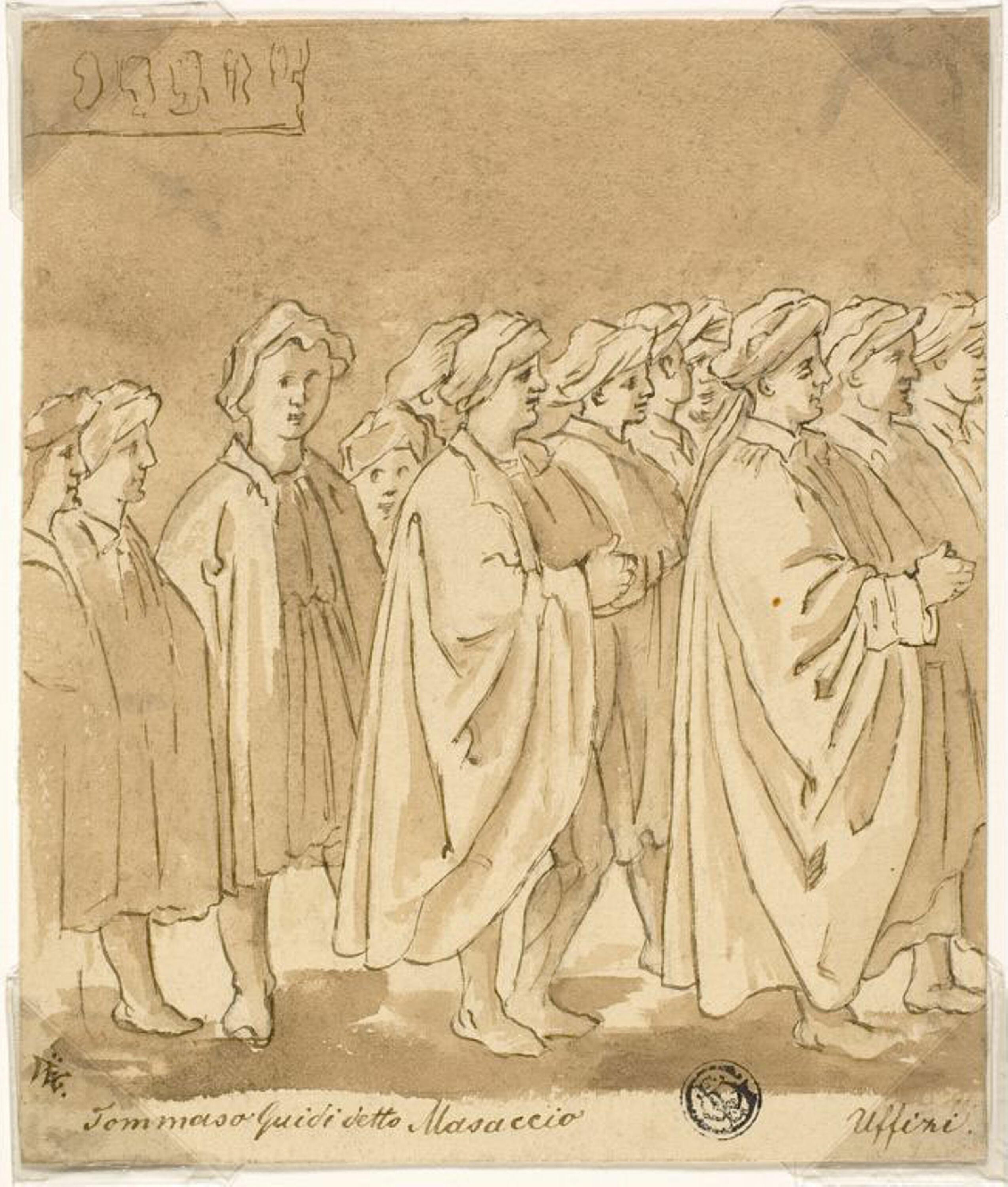
Unknown, after Masaccio: Procession of Figures (1700–1899)
" … mistaking wheel reinvention as some sort of fatal mistake …"
I've long suspected something fishy about process, and not just because of my professional encounters with Process Nazis, those people who could only see their worlds as a series of sequential procedures due to a genetic mutation or something. Modern recipes have no ancient counterpart, for the ancients never managed to become slaves to their routines. Instead, they seemed to have retained the ability to hold their intentions more lightly. As a result, they could only mass-produce a little of anything. Also likely true, they probably lived more satisfying lives as a result.
Now, we inhabit civilizations addicted to our processes. We imagine that these represent our strategic advantage. We've already figured out how to do so many things that we've sidestepped discovery. We can consequently plan ahead and even hold ourselves accountable for producing previously predicted futures. We sometimes even manage to replicate prior results to gain efficiencies of scale. Ours would certainly be historical miracles if viewed through many of our forebears' eyes. They might marvel at all we've accomplished, and we might even consider ourselves superior specimens of human evolution, though the ancients might catch themselves sniggering at our arrogance.
I have been discovering some MetaProcessing while preparing my stories for publication. The process seems Meta because it appears to inhabit a different plane, above and beyond any predictive one. Rather than reliably forecast upcoming actions, it satisfies itself by observing whatever's unfolding before me. I developed rough notions of what I should be doing but left myself open to veering off this notional course whenever necessary. Rather than following a recipe, I am watching a process reveal itself. This one does not seem to be intended for me to follow but more for me to gain insight, understanding, and perhaps, above all, appreciation. Success needs to come from other means than comparing experience to prior expectations. My MetaProcess reveals experiences and shifts expectations rather than insisting upon one narrow presentation.
This MetaProcess will not likely result in a smooth set of steps anybody might follow to replicate my successes or failures. It should produce stories, as it has, which should not be mistaken by me or anybody as the best way to achieve anything. They might spark insight and even a reassuring sort of post hoc knowing, but hopefully never the more popular anticipatory kind. How many times should anyone attempt to replicate the same steps before concluding that they fully understand them? The Muse bakes bread every damned week and still produces remarkable variations. She's learned that almost anything might result in differences. Often, she can only speculate as to why the recipe she's successfully followed before produced something horrible that last time. Reinventing the wheel seems to be the purpose and not evidence of any problem. The deeper problem might come from mistaking wheel reinvention as some fatal mistake rather than the eternal imperative.
The Muse cannot blindly follow her recipe, for it continually demands reinterpretation and MetaProcessing. The worst condition might well emerge from the presumption that she knows beforehand. Then, certainty becomes the overriding problem, and the quality of her experience plummets. Certainty seems the precursor to much human suffering when we largely suspected it could provide salvation. Our processes seem subtly damning. Please do not ask me how I do something, but what I'm learning. I hope never to know how to accomplish Publishing, but to accumulate some enlightening stories, courtesy of my MetaProcessing.
—
The Active Pursuit of Incompletion
Daniel Webster embarked on a fool's mission when he resolved to produce a dictionary, for his product would simply have to be incomplete or never be finished. It's been a work in process for two hundred years and will forever be on its way to completion without ever arriving. Still, we can hold a dictionary and look up words even though the book's eternally less than comprehensive. What in this world does not resemble this? My Publishing work will never be finished. Neither will your work. We still engage, with diminishing belief that we fully understand anything, emerging experts at not being an expert in anything yet. I seem asymptotic to myself, a work in process and not one in the process of completing but in the active pursuit of incompletion. It has never been a lick different here, and don't let anybody tell you differently!
Weekly Writing Summary
————
I began my writing week confessing to a shortcoming just short of sin in *A-Eye, where I admitted that I'd started using an Artificially Intelligent editing engine to proof my writing. This posting proved the most popular this period. "I never learned my grammar. I mean that I never could remember the rules. I have always relied upon a kind of intuition instead, a felt sense that resulted in my own quirky style, which might be an alternative way of saying that I have always written wrong."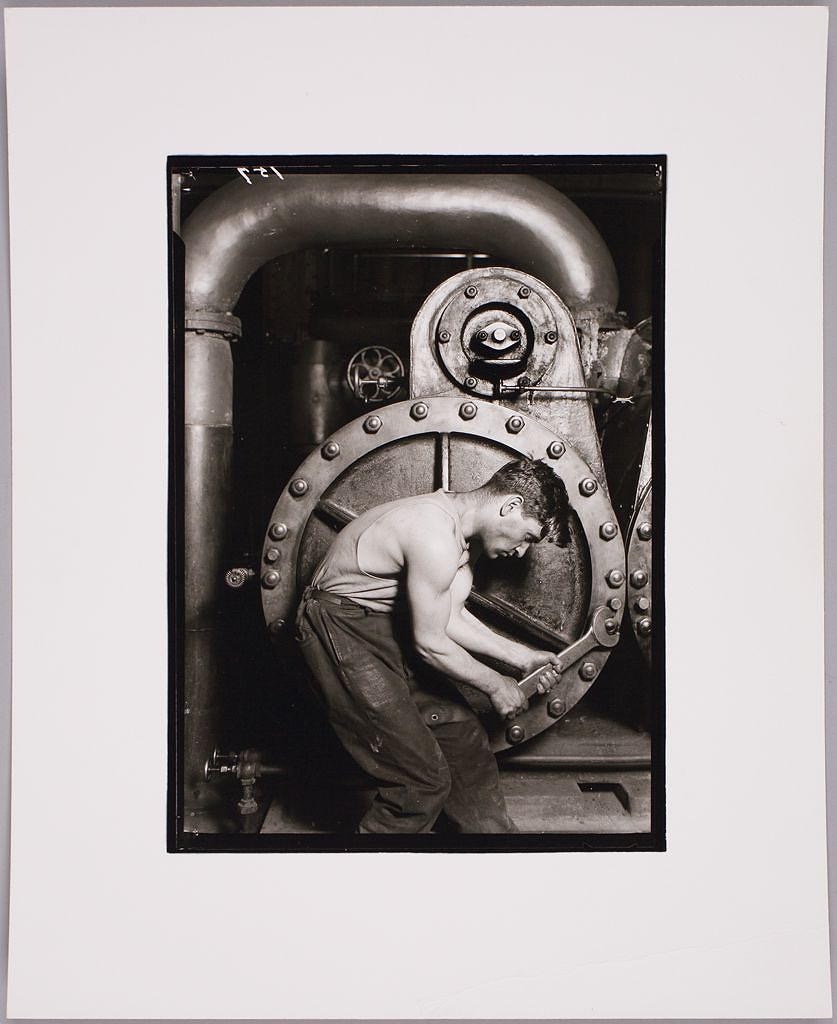
Lewis Wickes Hine: Powerhouse Mechanic (1921)
" … a rather bleak and lonely job …"
—
I reported on the incresingly complicated process by which I publish my daily stories in Choreography. "I understand that nobody's ever figured out how to document Choreography, though there's a notation; it requires a tremendous amount of interpretation. Dance routines depend upon repetition on top of the originating inspiration."
Thomas Lord Busby: Billy Waters, a one-legged busker.
Colored engraving from Costumes of the Lower Orders in Paris (1820)
"I build my castle upon shifting sands."
—
I mused on the taming I do when preparing my stories for publishing in Homogenizing. "When creating, the writer wisely ignored many of the lessons their teachers tried to impart in favor of listening to their small, almost still voices emanating from their heart. Hearts do not know crap about comma placement, however, and no amount of intuition, no matter how damned well-intended, can predict what a Grammar Nazi might insist. It seems helpful to pass the work by Hoyle to gain his perspective, but a writer must never cede creative rights to any rule book."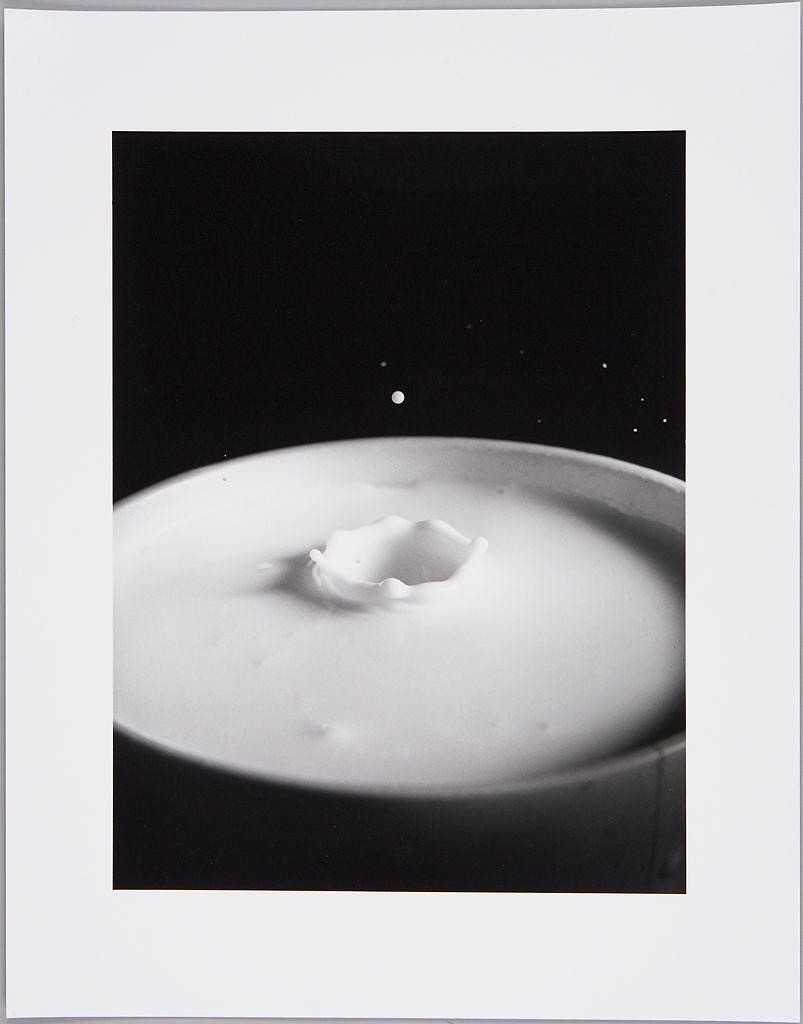
Harold Edgerton: Milk Drop into Cup of Milk (2) (1935)
“ … only become accessible once Homogenized …”
—
I watched myself stumble into one sure and certain result of professional practicing, KnowingNuthingness. "I am learning that everyone occasionally catches themself KnowingNuthingness. The question then transforms from, "How do I demonstrate my competence? into "How might I humbly perform my practice?" The former screams a neediness as if the practitioner could not possibly afford to make mistakes in the practice. The latter accepts some underlying fallibility, a kind of knowing about incomplete knowing that might delineate the difference between a wannabe and an authentic practitioner."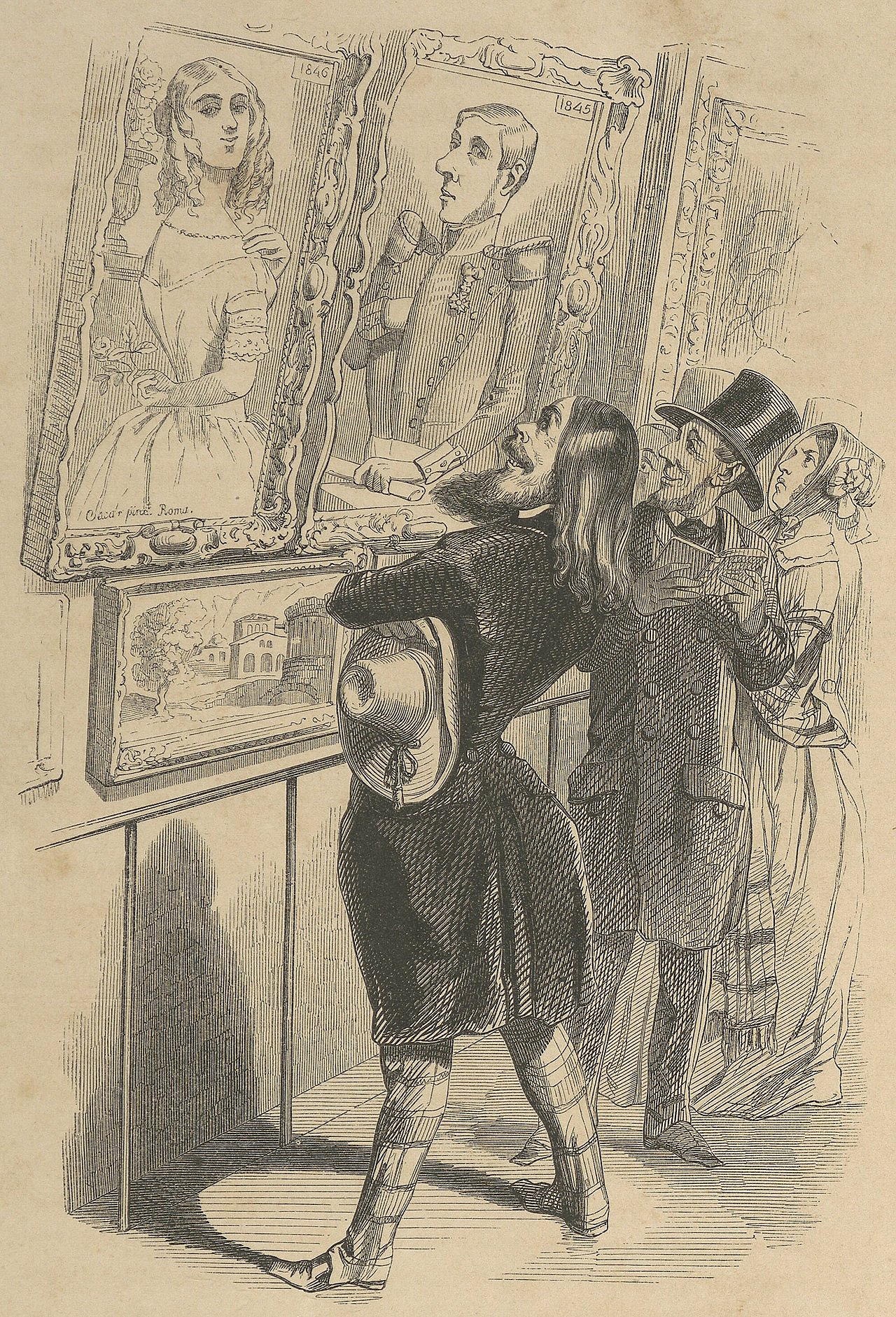
Jean Ignace Isidore Gérard Grandville:
Artist admiring his work.
Jerome Paturot a la recherche d'une position sociale
[Jerome Paturot is looking for a social position] 1846
"It's an unfair trade …"
—
I caught myself slowing down and stalling, a state I defensively labeled StrategicHesitation. "Head in clouds, navigation becomes iffy—head above clouds, landings, speculative. We operate to big what-ifs when we first attempt to make any improvement. A step in what seems like the right direction will almost always be easier to recover from than any leap made in any direction."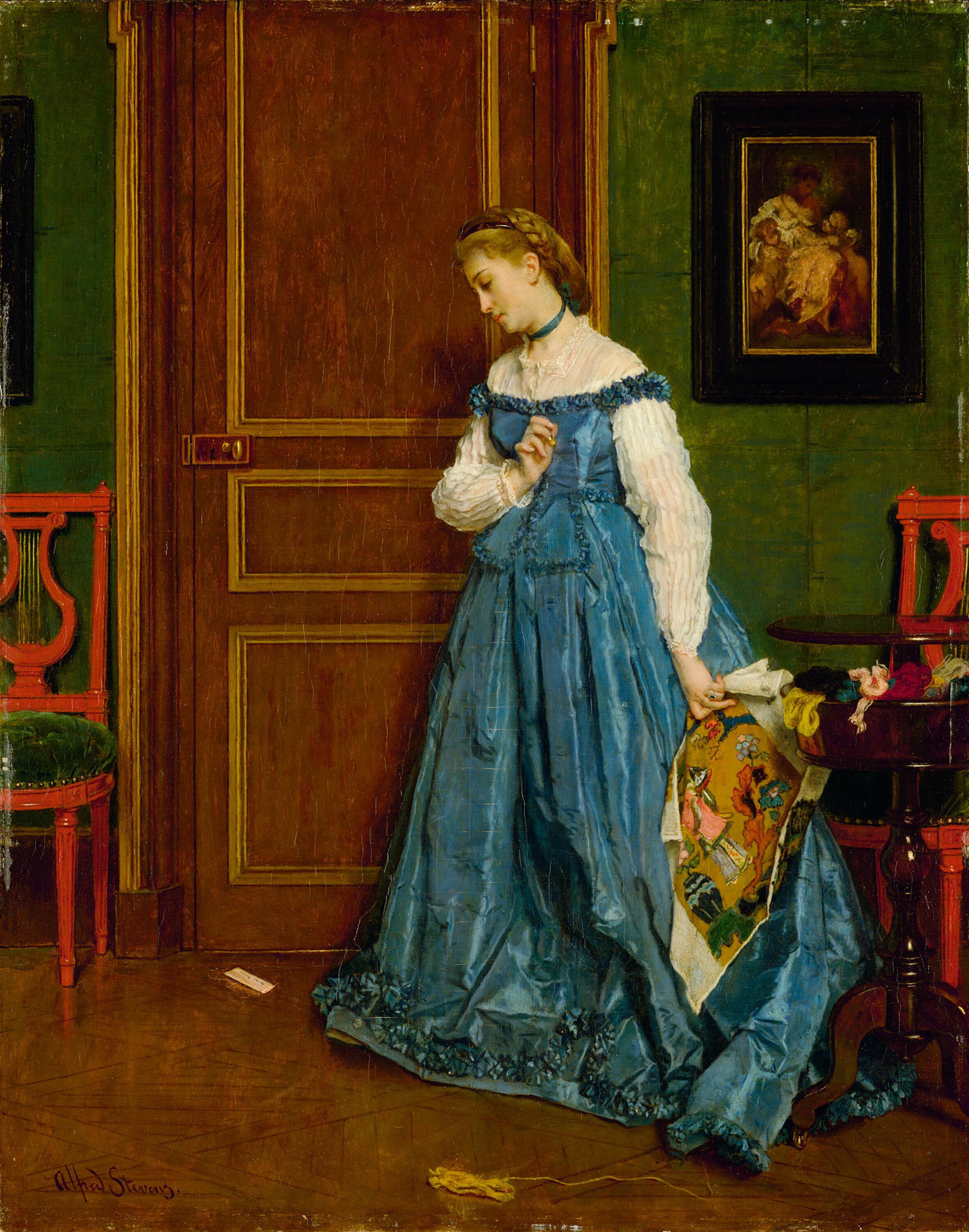
Alfred Stevens: Hesitation [Madame Monteaux?] (c. 1867)
"I might just be playing chicken with myself."
—
I apologize for attempting to describe the quirky means by which I have been attempting Publishing in Parallelling. "I maintain and manage a massively parallel publishing system consisting of many disparate parts conceptually connected but otherwise distant from and invisible to each other. I serve as the sole integrating factor, for only I know where the bodies have been buried because I was the one who buried every one."
Rudolph Ruzicka:
Lowell House, Harvard University (c. 1931-32)
"My world, like yours, thrives on such intentions."
—
I ended my writing week comparing my preparing for Publishing to Bletting, a sort of strategic rotting. "I catch myself wondering whether I wrote this. It seems so much different with color, texture, and flavor aged within a whit of turning rotten."
Pieter Withoos: Still Life with Plums, White Plums, Peaches and Medlars (17th century)
" … maturing into final form."
I found this writing week profoundly frustrating as well as enormously reassuring. I caught myself being myself when wrestling with incorporating artificial intelligence technology into my Publishing, perhaps because that was its first encounter with any intelligence. Unsurprisingly, the resulting choreography astounded me. I caught myself knowing nothing again, a familiar sensation, before invoking strategic hesitation. I realized that I had been multitasking, maintaining a massively parallel system, before ending my writing week, acknowledging that my sense that my stories had been rotting might just have been some necessary bletting of them. This writing week perfectly represented what I intended to describe as MetaProcessing.
Thank you for following along!
©2023 by David A. Schmaltz - all rights reserved


